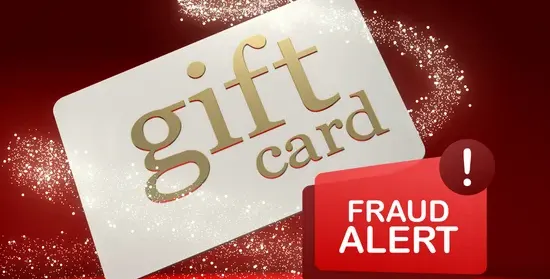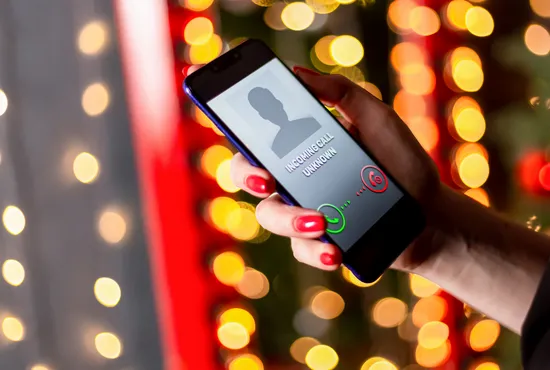
Gift Card Scams - Another Way To Rip-off Your Money!
Gift card scams are fraudulent activities in which fraudsters use payment methods such as gift cards to commit crimes. Gift card fraud involve a variety of tactics, and they can be used by both individuals and organized crime rings. Especially during the holiday season and after-Christmas sales period, it is a paradise for scammers who reap a real harvest. Read what you need to do to avoid being scammed.
What are the most common types of gift card fraud?

The most common type of gift card scam involves using stolen or counterfeit cards to purchase items from legitimate retailers. In this type of scam, the fraudster obtains the gift card number and expiration date such as iTunes gift cards, then uses the information to make purchases online or in stores. The fraudster then sells the purchased items for cash or transfers them to another account for a cut of the profits.
Another common tactic is known as "cashing out." This involves loading funds onto a prepaid debit card with a stolen gift card number, then using the debit card to withdraw cash from an ATM or purchase goods with a fraudulent account. This can be done in store locations or remotely, by using stolen credit cards and counterfeit documents.
Also, be wary of a deceitful trick that is going around the country, where fraudsters have overlaid fake barcodes onto original ones. Unsuspecting consumers who buy gift cards with these altered codes are unknowingly loading money into someone else’s card - one in which the scammer has complete access to.
Scammers may call and pretend to be government officials, telling you that you are behind on your taxes or missing a payment. They ask you to buy a gift card as payment.
Scammers can take many faces, not just from a government agency
Another method used by fraudsters is to pass themselves off as family member. Elderly people in particular are exposed to such situations when a friend of a grandchild calls to ask them to make a transfer or buy a gift card.
No matter the pretext, fraudsters all abide by a comparable plan: you receive an alarming phone call that necessitates you to urgently acquire gift cards of prominent brands from your nearest shop, usually a convenience store. Once acquired, they urge you to share the code printed on the back with them over the line. In no time at all, these gift card scammers are ready and able to take advantage of your hard-earned money!

Why do fraudsters prefer gift cards?
Gift cards are completely untraceable, they are anonymous, just like cash. These types of transactions are almost completely impossible to trace, which is why it is so important to be vigilant.
How to avoid gift card scams?

In order to combat gift card scams, retailers must take steps to secure their systems and verify customer information before allowing purchases. They should also monitor transactions for suspicious activity and promptly report any fraud they encounter. Consumers can protect themselves by checking the balance of their gift cards regularly and avoiding unverified websites or vendors when purchasing items with gift cards.
Additionally, consumers should never share their gift card numbers with anyone else unless they are absolutely sure of who they are dealing with. By being aware of potential scams and taking proactive steps to protect themselves, consumers can reduce their risk of becoming victims.
If you buy your card stationary, make sure it is new and that no one has touched it or swapped it before. If you have any doubts, ask the salesperson for one of the brand new physical gift cards that has not been displayed in the shop.
If you have the opportunity to register your card, do so as soon as possible so that no one else can use your card number.
Gift cards are for gifts, not for payments

Above all, you have to be vigilant, there is no other recipe. There is no state or private institution that legally asks for payment in the form of a gift card. Don't be pressured into paying by buying a gift card, by anyone contacting you about a hacked computer, to pay bills, bail money, to help your family or anything else. Don't fall for these types of techniques!
If you want to purchase gift cards for yourself or as a gift, do so only in an authorised stationary or online shop. Do not take advantage of random offers that if you buy from them you will get, for example, 20% extra. You can never be sure who is on the other side.
By understanding the tactics and techniques used in gift card scams, people can be better prepared to identify and protect themselves from fraudulent activities. Knowing how these scams work is key to preventing them in the future. Additionally, by taking proactive steps such as verifying customer information before allowing purchases and promptly reporting any suspicious activity, retailers can help to limit the amount of fraud they experience. By working together, consumers and retailers can reduce their risk of falling victim to gift card scams.
Beware of casual contacts on social media and dating sites. Often, newly met people ask for help for themselves or charities or shelters, precisely in the form of gift cards, as they are virtually impossible to spot. Watch out for such activity.
Similarly, if you get an email or someone contacts you and tells you that you have won the lottery, even though you have not entered any competition. You have to pay a small deposit in the form of a gift card to claim your prize.
I am a victim of scam. What to do?
If you think you've been the victim of a gift card scam, it's important to take action as soon as possible. Report it to Action Fraud by calling 0300 123 2040 or via their website at www.actionfraud.police.uk/report_fraud. You should also contact your bank or card issuer to advise them of what has happened and ask them to cancel any payments you have made in relation to the scam.
Remember, if something seems too good to be true, then it probably is - don't fall for gift card scams! Stay safe online and always check that offers are from a legitimate source before making any kind of payment in exchange for goods or services.